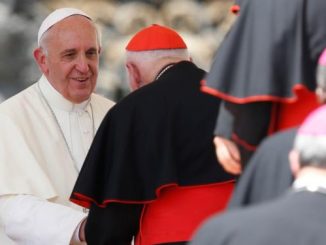
Vatican City, Oct 4, 2018 / 09:38 am (CNA/EWTN News).- Young adults are struggling to realize their passion, something to center their lives around, and the Church can help them find meaning, one young synod participant from Vietnam said Thursday.
Speaking at a press briefing on the second day of the youth synod, Joseph Cao Huu Minh Tri, 21, said today the idea of “finding your true passion” is a “hot topic,” especially in Vietnam, and is the subject of numerous YouTube videos, seminars, and books.
But with all these supposed resources, if they are helpful, “my question,” he said, “is why are there millions of young people and adults who are still struggling to find their true passion and live a happy life?”
What he would propose to bishops is an increased emphasis on human dignity and on promoting Catholic social teaching as a relevant way to engage with these modern issues, especially with practical guidelines for youth and young adults to follow.
“In the light of the Holy Spirit and faith, we believe that there is a way, based on the teachings of the Church, to be able to deal with the issues” young adults face and to help them find their true passion, “which should always be inspired by passion for the Lord,” he said.
During the briefing, the new head of the Vatican’s communications department, Paolo Ruffini, gave a general overview of the morning session of the synod on young people, faith, and vocational discernment, and the themes discussed in the interventions – short speeches – of the bishops.
The morning session included 25 interventions from various synod fathers, including U.S. delegates Bishop Robert Barron, Archbishop Charles Chaput, and Bishop Frank Caggiano; one from a curial cardinal; and one from a young adult auditor, Sr. Briana R. Santiago from San Antonio, Texas.
Major themes of the interventions included war and poverty, immigration, unemployment, sexuality, and sexual abuse, participants said.
Ruffini estimated the topic of sexual abuse was brought up in about 5 or 6 of the bishops’ interventions and Fr. Thomas Rosica, of Salt and Light Television, and the synod attaché to English-speaking journalists, said the bishops who spoke on the issue were not from only Western countries, but were geographically diverse, though he could not recall the exact countries they represented.
Santiago, a young adult auditor who is a consecrated woman in her fourth year of formation with the Apostles of the Interior Life, spoke about “the search” of young people during the morning session of the synod.
She explained that young people today are searching for many things, from a job or their vocation to the meaning of life and their identity.
Santiago was also a participant in the pre-synod meeting in March, at which she said she was surprised by how much the around 300 young people had in common, despite coming from different backgrounds and cultures.
“We young people want dialogue, authenticity, participation and there we were welcomed by adults who were available and eager to know what we carry in our hearts,” she shared, saying young people are aware of the many issues and needs of the world, but that they are grateful the Church is taking this moment in history to focus on them and their concerns.
“This is an honor and for us also a great responsibility, to be transparent and aware of our fragility in order to help not only ourselves, but also the generations that will come after us,” she said.
She also noted, from a personal perspective, the important role individuals played in her discernment process, such as her parish pastor, catechists, and a consecrated woman who took her seriously and accompanied her in discernment and in developing a deeper prayer life.
They helped her to see a welcoming Church that “cared for even the smallest member,” she said. “As it was for me, I believe that all of us young people need to be heard first, and then guided to enter more deeply into ourselves.”
Another synod participant, Italian sociology professor, Chiara Giaccardi, told journalists several bishops spoke about sexuality and the need to address the concrete reality of the person, an element of which is their sexuality.
Giaccardi said the idea was expressed that this dimension is not an enemy to the development of the person, but an integral part of them. And that there needs to be a recognition of a failure to accompany this dimension of young adults, to help them develop as a whole.
Bishop Carlos José Tissera of Quilmes, Argentina, emphasized that what he discovered in the process of speaking to young people and hearing from them ahead of the synod is the need to listen to the cries of real pain and suffering many of them are experiencing.
He said it is also the role of believers to recognize their position as intermediaries between youth and Jesus. “This isn’t just a sociological matter but a matter of faith,” he stressed.
If you value the news and views Catholic World Report provides, please consider donating to support our efforts. Your contribution will help us continue to make CWR available to all readers worldwide for free, without a subscription. Thank you for your generosity!
Click here for more information on donating to CWR. Click here to sign up for our newsletter.






Leave a Reply